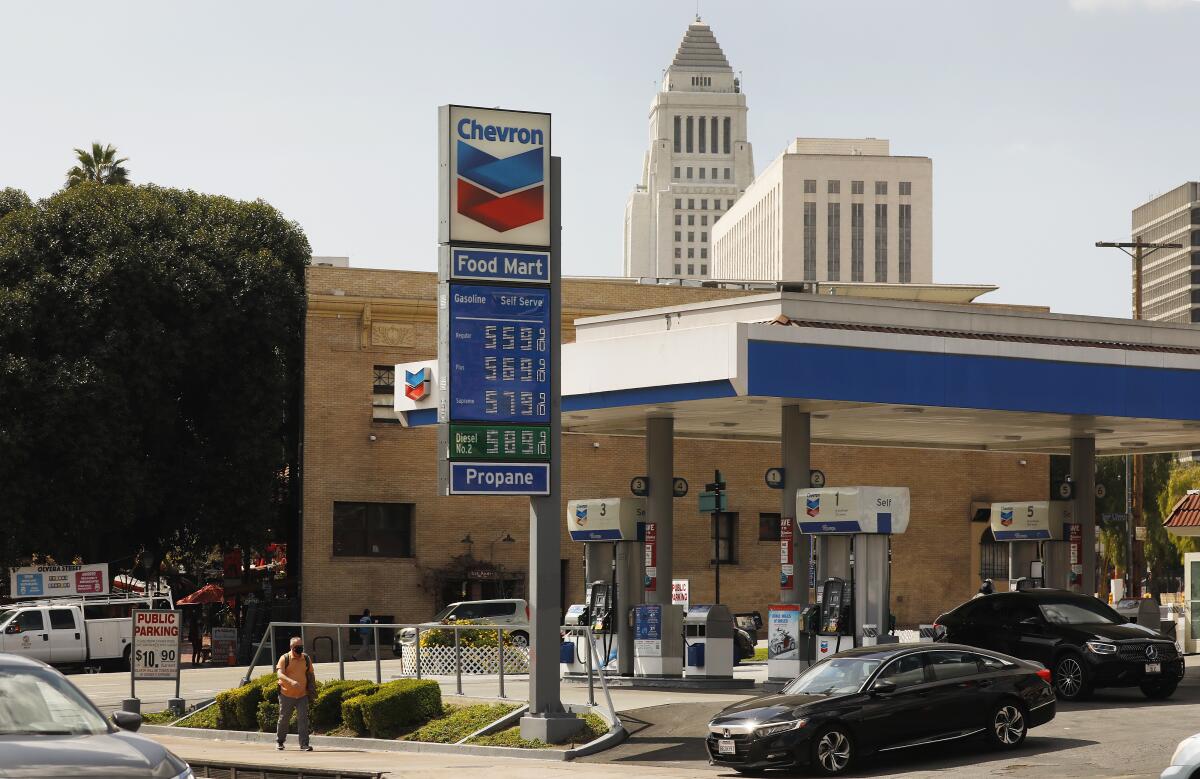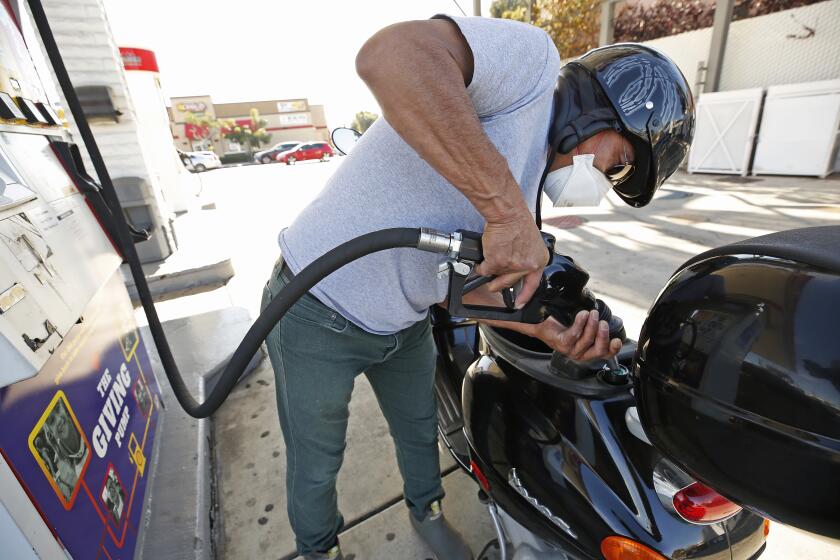Ukraine crisis: California gas prices move even higher

- Share via
“It’s crazy.”
That was Monica Simion’s reaction to the price of gasoline Tuesday morning at an Arco station in Monrovia, where a gallon of premium sold for $4.89. Total cost to fill up her SUV: $60.
Simion said she had been trying to coordinate carpools to cut down on driving, but that helped only so much. “We have no choice. We have to take our kids to school.”
“It’s not enough that we have a pandemic, but now we have these crazy gas prices,” she added.
Gas prices are higher than ever, and with tensions on the rise between Ukraine and Russia, there doesn’t appear to be an end in sight.
The average price paid for a gallon of regular gas across California hit a record high of $4.742 on Tuesday, according to the American Automobile Assn. That figure is the highest in the country and more than $1 higher than the national average, which currently sits at $3.531 a gallon.
For context, Tuesday’s $4.742 is 3 cents higher than last week’s average and 10 cents higher than last month’s average. A year ago, gas prices hovered around $3.573 a gallon in the state.
Russian President Vladimir Putin’s advances in Ukraine have put President Biden and the U.S. economy between a rock and a hard place.
Now, some forecasters are expecting the average price to top $5 a gallon sooner rather than later.
Chief among the reasons for the nationwide climb in gas prices is the threat of military conflict between Russia and Ukraine. Russia is the world’s third-largest producer of petroleum and other crude oil, according to 2020 data from the U.S. Energy Information Administration.
As the country takes steps toward a potential invasion of its former satellite republic, some fear it could cut off natural gas exports after sanctions by the U.S. and Europe.
Should that happen, European countries may be forced to turn to petroleum-based fuels to replace natural gas. That could send gasoline prices up by an additional 10%, said Shon Hiatt, an associate professor of management and organization at USC’s Marshall School of Business.
“The geopolitical risks are very high,” he said. “We’ll have to see how things play out.”
California doesn’t import any oil from Russia. As of 2020, the state brought in 24% of its oil from Ecuador, 23% from Saudi Arabia and 20% from Iraq, according to the California Energy Commission.
Still, the absence of a major exporter such as Russia would increase global demand for oil from other countries, which could affect the retail price in California. The state has become increasingly dependent on oil imports as it attempts to move away from fracking, making it increasingly vulnerable to external price swings.
“Foreign oil represents an increasing percentage of our sources,” said Marie Montgomery, a spokesperson for AAA. “Alaska oil has been going down, and California’s overall production has been going down.”
At about $91.55 a barrel, the average price of crude oil remains far short of the all-time record of $147.27 set in July 2008. That month, the non-adjusted average price of gas across California was $4.48, 1 cent short of the record set just a month prior in June.
In an address Tuesday announcing sanctions against Russia, President Biden said the White House would work to keep gas prices from skyrocketing. But, he said, Americans need to be “honest” about necessary sacrifices on the horizon.
“As we respond, my administration is using every tool at our disposal to protect American businesses and consumers from rising prices at the pump,” he said. “As I said last week, defending freedom will have costs for us as well, here at home. We need to be honest about that.”
Whatever transpires in Eastern Europe, a unique set of factors probably will result in California prices remaining significantly higher than the national average.
California maintains its own standards for the formulation of gasoline sold in the state, rules that are intended to reduce pollution. The cleaner gas is more expensive to produce, and few refineries outside the state are able to make it. There are also no interstate pipelines carrying gasoline into California, meaning all imports must come by ship or truck, both of which are more costly.
The jump in fuel prices comes as Californians start planning for spring break vacations. Road trips have become increasingly popular since the start of the COVID-19 pandemic, but rising gasoline prices may tilt the balance toward air travel or so-called staycations.
A recent study by Outdoorsy, a recreational vehicle rental site, found that the number of long-distance road trips — defined as trips between 100 and 500 miles made in a personal vehicle — averaged around 72 million in the last two years. That’s up from 60 million a week in 2019, according to data from the U.S. Bureau of Transportation Statistics.
Montgomery said it was too early to tell whether travelers would call off their vacations because of the surge in prices or perhaps modify their plans.
“The nice thing about road trips is that they’re flexible in budget,” she said. “You can spend one less day, you can bring food instead of eating out. You can do a lot of things to make up for the gas, we’ve seen that in the past.”
Even people who are just driving across town are feeling the pressure at the pump.
Craig Robertson, who lives in Bradbury Estates and operates two dry-cleaning businesses in the Financial District, said he recently started taking the Metro rail to his shops to save on gas. “I’ve never experienced prices this high,” he said as he filled up his tank at the Arco station in Monrovia.
Josh Skinner, who lives in Monrovia and drives to his job with AT&T in Orange County, was resigned to paying more for his commute. “I really don’t have a choice,” he said. “I gotta do what I gotta do.”
Times staff writer Anumita Kaur contributed to this report.
More to Read
Inside the business of entertainment
The Wide Shot brings you news, analysis and insights on everything from streaming wars to production — and what it all means for the future.
You may occasionally receive promotional content from the Los Angeles Times.













